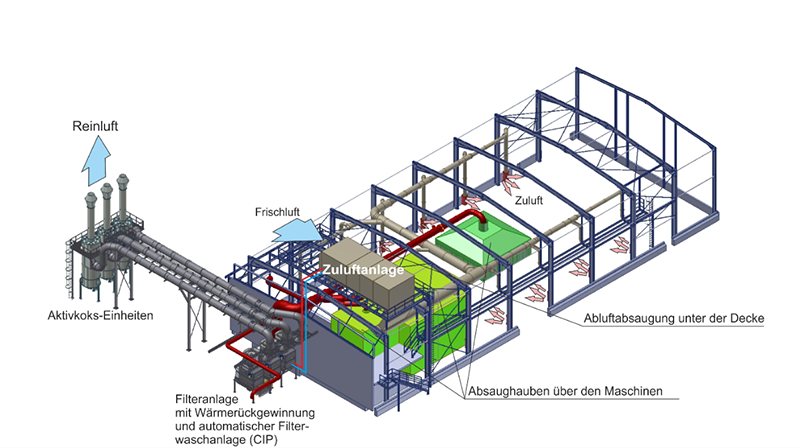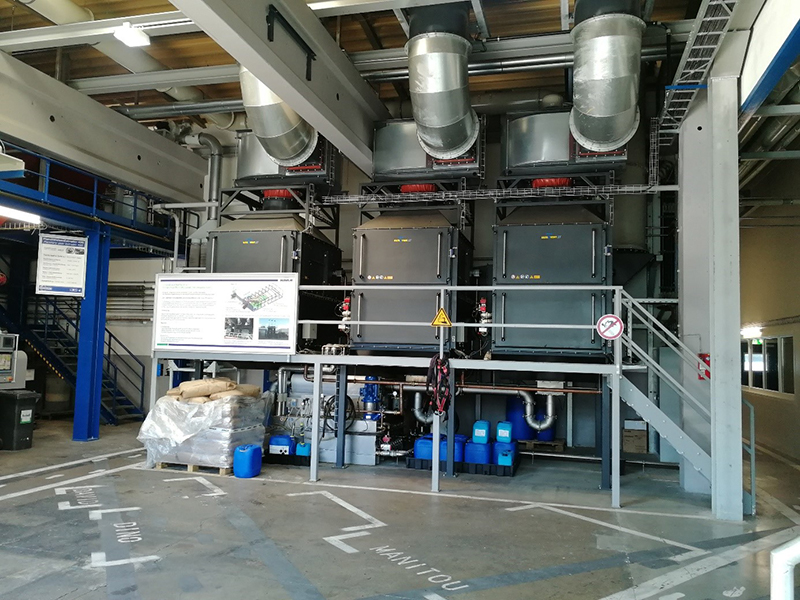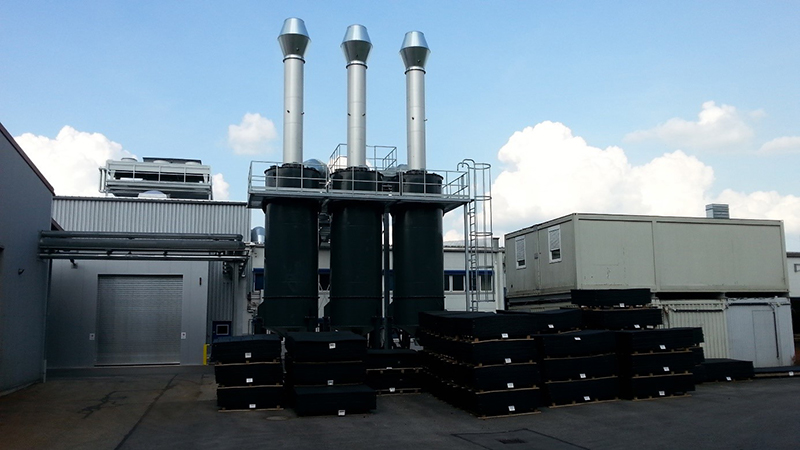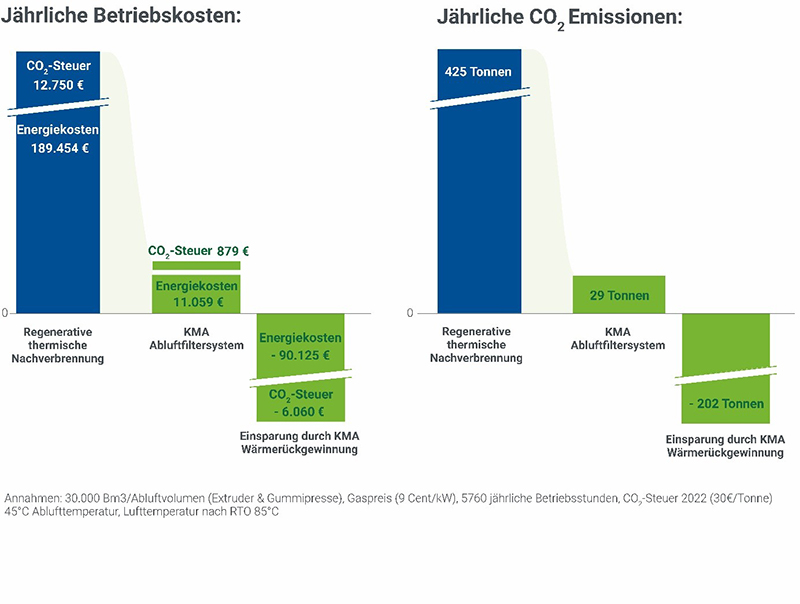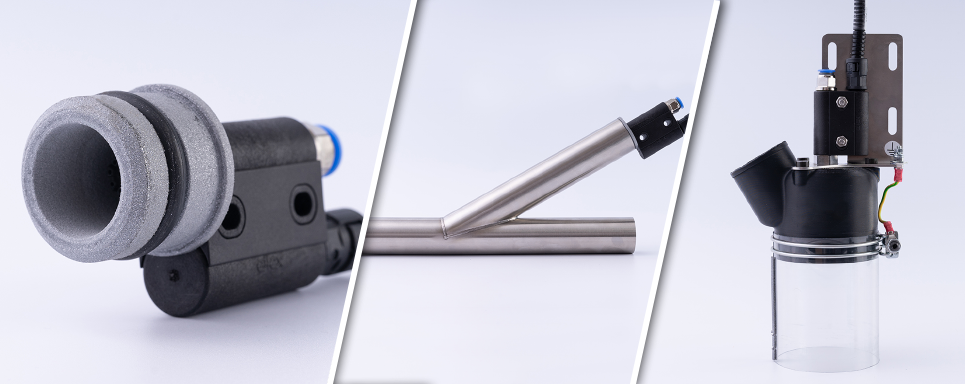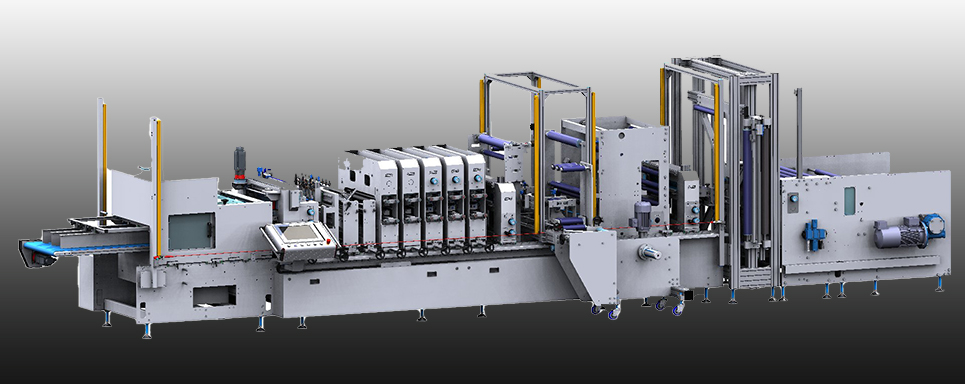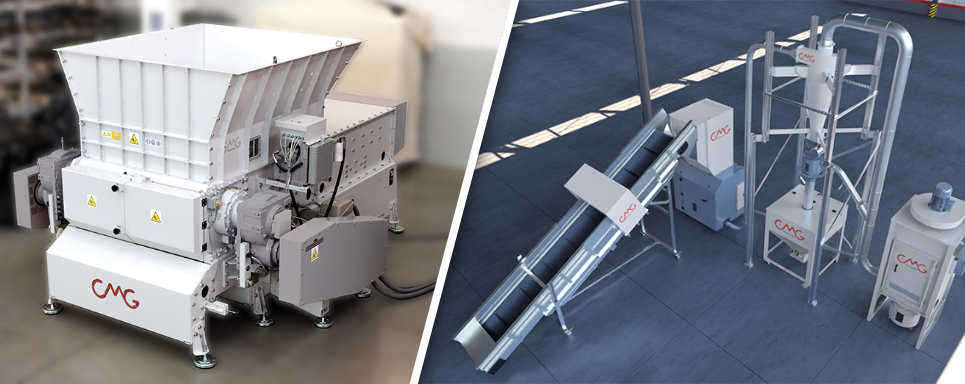How can you effectively filter your exhaust air in plastics processing and save energy at the same time? KMA Umwelttechnik will be providing answers to this question at K 2022. An application example at the Gummiwerk Kraiburg Elastik (rubber factory) shows the potential of the technology from Königswinter.
The ecological and economic business climate in the plastics industry is getting tougher: how can energy costs currently be saved, gas dependency limited and CO2 emissions reduced?
With these issues surrounding energy efficiency and environmental technology, the correct handling of production waste air is becoming increasingly important, and not only in plastics processing. Strict regulations on permissible emissions for substances and odours make effective exhaust air treatment necessary for many manufacturing processes. At the same time, exploding energy costs and the sustainability goals of the plastics industry pose challenges for many of the plastics processing companies. Gummiwerk Kraiburg Elastik GmbH & Co. KG, Tittmoning, invested in an energy-efficient exhaust air filter system with integrated heat recovery for its new production hall and saves over EUR 200,000 in energy costs and 400 t of CO2 annually compared to a regenerative thermal incinerator (RTO).
The production and processing of rubber products leads to strong odour emissions. Particularly during the thermal deformation of rubber components and in the cooling phase of the finished product, there can be a high level of odour pollution. Extrusion in particular leads to strong air pollution from oil and emulsion mist as well as plasticiser vapours. In the worst case, these can have adverse health effects on staff or negative impacts on the environment. The comprehensive separation of polluted production exhaust air and odour emissions is thus also indispensable in accordance with legal regulations. In addition, the extrusion of elastomers and plastics requires large amounts of thermal energy, a valuable resource that is often released into the environment unused and untreated without recovery.
Gummiwerk Kraiburg Elastik produces high-quality elastic stable floor coverings for animal husbandry using a special recycling process. As an environmentally conscious manufacturer, Kraiburg Elastik relies on a sophisticated production process based on the recycling of old rubber. Old truck tyres are recycled into rubber granulate, which is reused to produce the company's own rubber mats. Due to thermal decomposition, strong-smelling vapours are produced at four points on the production line during the production process.
As part of an expansion of production capacities, a new hall was built for this process. To achieve energy-efficient and environmentally friendly operation of the new rubber mat press, a supply air and extraction system with heat recovery was to be integrated. The company's main objectives were to optimise the clean air quality beyond the specified clean air standards of less than 10 mg/m³, to reduce odour emissions in the production hall and the surrounding area, and at the same time to reduce the energy required for exhaust air treatment. In addition, an advanced heat recovery system was to make intelligent use of the waste heat generated from the thermal forming process in order to reduce overall energy costs such as those from building heating. To realise these goals, the company opted for a modern exhaust air filter system from KMA Umwelttechnik, Königswinter.
The polluted production exhaust air is collected at the emission sources by extraction units at the emission-critical machines and a central ceiling extraction unit and cleaned by a central filter system with a volume of 60,000 m³ per hour. Subsequently, the air extracted during the production process is replaced by fresh air.
The central exhaust air filter system, consisting of a heat exchanger, electrostatic precipitator and carbon filter, extracts the process heat contained in the exhaust air, reliably separates the oily smoke, and effectively binds the disturbing odours. The system has an automatically operating cleaning in place (CIP) system for the electrostatic precipitators and heat exchangers, comparable to an integrated dishwasher. This ensures high operational readiness and, at the same time, high efficiency of the smoke separators and heat recovery.
And this heat recovery pays off. The energy recovered via the heat exchangers is used via a carrier medium to heat the fresh air through the supply air system and fed into the hall as heated fresh air via a layered ventilation system. In this way, the production hall is heated to a constant 17 °C in the winter months without the need for additional energy - a conventional hall heating system is no longer necessary.
If a conventional gas-fired hall heating system were used, the heating costs would amount to around EUR 90,000 per heating season, assuming a normal annual utilisation of 3,280 working hours. In contrast, the operating costs of the KMA ULTRAVENT filter and heat recovery system are only about 11,000 EUR. The CO2 avoidance effect due to the integrated KMA heat recovery is also significant: by implementing the new exhaust air filter technology, CO2 emissions could be reduced by a further 200 t per year.
The strength of the system becomes even clearer in comparison with other established processes for exhaust air purification. Due to the applicable TA-Luft regulations, afterburning plants, for example, must be operated at over 700 °C in order to adequately separate emissions and odours from the production exhaust air. The following principle applies: the higher the material and odour loads in the exhaust air, the higher the temperature of the afterburning system must be fired. The associated energy consumption entails very high operating costs and secondary emissions (CO2, CO) for the plastics processing company.
The KMA exhaust air filter system cleans the exhaust air completely without combustion, thus consuming over 90 % less energy and causing correspondingly lower CO2 emissions compared to an RTO. In addition, the KMA heat recovery system reduces operating costs by another 90,000 EUR by eliminating the need for hall heating.
The example of the cooperation between Kraiburg Elastik and the exhaust air purification experts from KMA Umwelttechnik shows how environmentally and cost-conscious manufacturers of plastic and rubber products can achieve sustainable exhaust air purification and equally significant energy savings at their production sites.
KMA will be exhibiting its environmental technology at K 2022 on the FSK joint stand.
Hall 7A | Stand 07a-B26-C25
